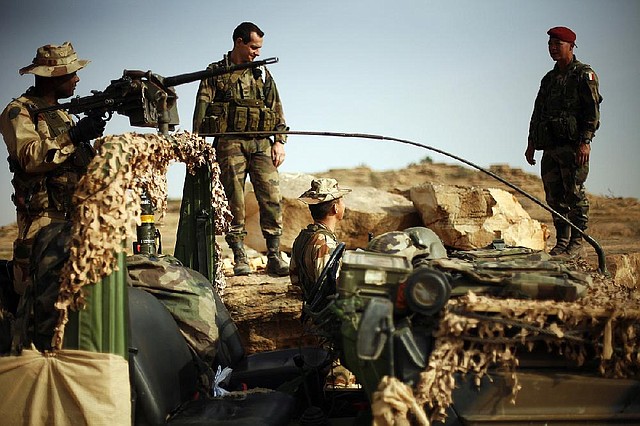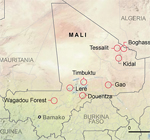Key Mali rebel group splinters
French soldiers man an observation post Thursday outside Sevare about 400 miles north of Mali’s capital, Bamako.
Friday, January 25, 2013
SAN, Mali — Mali’s rebel movement showed new signs of discord Thursday in the wake of punishing French airstrikes, with one wing of the Ansar Dine group now pledging to negotiate an end to the country’s crisis and possibly even fight against its former comrades-in-arms.
France’s air and land campaign that began two weeks ago to save Mali’s interim government has shaken up the military landscape and put the international spotlight on the former French colony. Mali’s government was on a new political defensive, urging its soldiers to respect human rights after new allegations that they had carried out summary executions in zones of battle against the radical Islamists.
Three al-Qaida-linked extremist groups have controlled Mali’s vast northeast for months, capitalizing on chaos that followed a coup d’etat in Mali’s capital, Bamako, in March. But in a new sign of splintering, former Ansar Dine leader Alghabass Ag Intalla said Thursday that he and his men were breaking off from Ansar Dine “so that we can be in control of our own fate.”
“We are neither AQIM or MUJAO,” he said of the other groups, al-Qaida in the Islamic Maghreb and the Movement for the Unity and Jihad in West Africa, known by its French-language acronym. “We are a group of people from the north of Mali who have a set of grievances that date back at least 50 years.”
The comments suggested that at least some Islamist fighters are searching for an exit in the wake of the French airstrikes. French radio RFI reported earlier Thursday that Intalla’s new group will be called the Islamic Movement for the Azawad, a Tuareg term for northern Mali, and his men are willing to fight their former comrades in-arms in Ansar Dine.
“We are not terrorists. We are ready to negotiate,” Intalla said.
A French diplomatic official said France was taking seriously the claims of a split within Ansar Dine - but needed proof, not just words.
The Islamic Maghreb and the Movement for the Unity and Jihad in West Africa have been classified as terror groups by the U.N., and Ansar Dine has been “clearly associated” with them - even if some of its members have raised doubts about how close those ties are, the official said.
“The other groups that have formed need to show which side they’re on ... and prove it on the ground,” said the official, who was not authorized to discuss the matter publicly. “Are they with the terrorists, or not?”
“They could, for example, free up territory themselves and no longer say that the Malian army is not welcome in the north - and instead work with it,” the official said.
Late last year, Ansar Dine held talks in neighboring Burkina Faso with Malian government representatives, and one of the sticking points was a disagreement over whether Malian law or Islamic Shariah law would be applied. Rebels have at times applied their interpretation of Shariah to carry out public executions, amputations and whippings - for infractions ranging from possessing cigarettes to women going out without head scarves.
Intalla suggested a new flexibility: “Shariah is our religion, we cannot renounce our religion. But whatever causes problems within it, we’re willing to take a look at.”
On Jan. 19, the group said in a statement on a jihadist forum that “the people of northern Mali are prepared to sacrifice everything in order to live under Shariah-based governance,” according to SITE Intelligence Group.
An elected official from Kidal, who insisted on anonymity for fear of reprisal, said Thursday that the split was a long time coming and reflected how Ansar Dine, which took over the northern city of Kidal, enlisted large numbers of fighters and co-opted local authorities for economic and political reasons - not ideological ones. Intalla, an ethnic Tuareg and the heir to Kidal’s traditional ruler, isn’t believed to be a radical Muslim, he added.
Word of the new dissension within rebel ranks came as the government was confronting its own troubles: The most vocal allegations yet that its depleted army - which was badly splintered and weakened during the coup d’etat - had been responsible for human-rights abuses along the battle zones separating the rebels in the north and government-controlled south.
“For several days information has come ... pointing to abuses committed on the ground that point to abuses that verge on human rights violations,” the prime minister’s office said in a statement. “The government reminds the army and security forces to show strict respect of human rights ... the government will see to the strict respect of these norms.”
On Wednesday, a witness said Malian soldiers shot people accused of ties to the radical Islamists at a bus stop in Konna, along the dividing line, and threw their bodies into nearby wells around the time when the French campaign began. Also Wednesday, French human-rights group FIDH accused Malian forces of dozens of “summary executions” in the area.
French President Francois Hollande authorized a military intervention two weeks ago and fighter jets have pounded rebel training camps, arms depots and bases. Since then, the Islamists appear to have fled from the cities, although they still remain firmly in control of much of northern Mali, likely using their desert bases and the area’s natural topography, including cave systems in the Kidal region.
Information for this article was contributed by Jamey Keaten, Baba Ahmed and Angela Charlton of The Associated Press.
Front Section, Pages 7 on 01/25/2013

